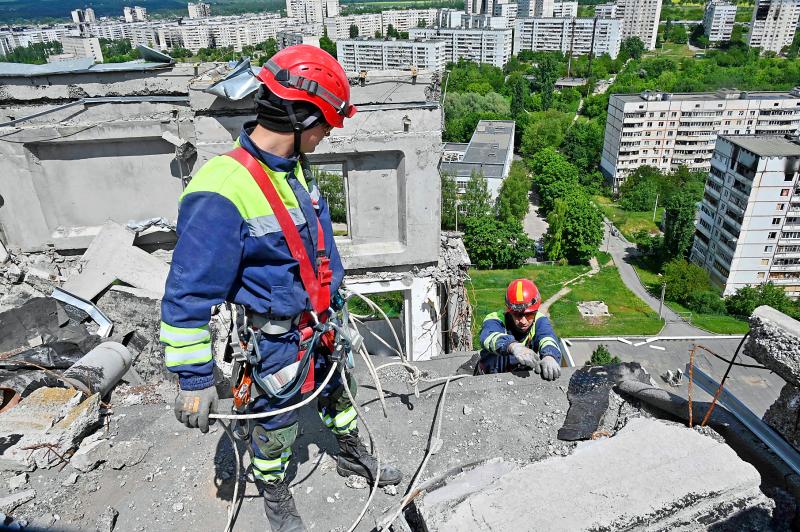Ukrainian forces battling Russian troops in a key eastern city yesterday appeared to be on the cusp of retreat, although the regional governor said that they were still fighting “for every centimeter” of the city.
The urban battle for Severodonetsk testified to the painstaking, inch-by-inch advance by Russian forces as they close in on control of the entire Luhansk region, one of two that make up the industrial heartland known as the Donbas.
After a bungled attempt to overrun Kyiv in the early days of the war, Russia shifted its focus to the region of coal mines and factories.

Photo: AFP
The region has been partly controlled by Russia-backed separatists for years, making supply lines shorter and allowing Moscow to tap separatist forces to back its offensive.
However, Russia also faces Ukraine’s most battle-hardened troops, who have been fighting the separatists for eight years there.
The result is a slow slog, with both sides exchanging artillery barrages that seemingly inflict heavy losses and neither appearing to have the clear momentum.
Luhansk Governor Serhiy Haidai said that there were difficulties in Severodonetsk, telling reporters: “Maybe we will have to retreat, but right now battles are ongoing in the city.”
Earlier, on the Telegram messaging app, he said that Ukrainian forces were fighting “for every centimeter of the city.”
He said that they might pull back to positions that are easier to defend.
The city across the river, Lysychansk, sits on higher ground.
Severodonetsk became the administrative capital of the region after the city of Luhansk was taken by separatists in 2014. It and Lysychansk are wedged between Russian forces to the east, north and south, and are among a few cities and towns in Luhansk still holding out.
The Kremlin has said that its forces are in control of nearly all of the Luhansk region and about half of the Donetsk region, which rounds out the Donbas.
Meanwhile, to the north, Russian shelling of the northern Kharkiv region killed five people and wounded 12, regional governor Oleh Syniehubov said.
Russian military officials said that “air-launched, high-precision missiles” were used to hit a factory near Kharkiv that repairs armor.
There was no confirmation from Ukrainian officials of such a plant being hit.

ROLLER-COASTER RIDE: More than five earthquakes ranging from magnitude 4.4 to 5.5 on the Richter scale shook eastern Taiwan in rapid succession yesterday afternoon Back-to-back weather fronts are forecast to hit Taiwan this week, resulting in rain across the nation in the coming days, the Central Weather Administration said yesterday, as it also warned residents in mountainous regions to be wary of landslides and rockfalls. As the first front approached, sporadic rainfall began in central and northern parts of Taiwan yesterday, the agency said, adding that rain is forecast to intensify in those regions today, while brief showers would also affect other parts of the nation. A second weather system is forecast to arrive on Thursday, bringing additional rain to the whole nation until Sunday, it

LANDSLIDES POSSIBLE: The agency advised the public to avoid visiting mountainous regions due to more expected aftershocks and rainfall from a series of weather fronts A series of earthquakes over the past few days were likely aftershocks of the April 3 earthquake in Hualien County, with further aftershocks to be expected for up to a year, the Central Weather Administration (CWA) said yesterday. Based on the nation’s experience after the quake on Sept. 21, 1999, more aftershocks are possible over the next six months to a year, the agency said. A total of 103 earthquakes of magnitude 4 on the local magnitude scale or higher hit Hualien County from 5:08pm on Monday to 10:27am yesterday, with 27 of them exceeding magnitude 5. They included two, of magnitude

CONDITIONAL: The PRC imposes secret requirements that the funding it provides cannot be spent in states with diplomatic relations with Taiwan, Emma Reilly said China has been bribing UN officials to obtain “special benefits” and to block funding from countries that have diplomatic ties with Taiwan, a former UN employee told the British House of Commons on Tuesday. At a House of Commons Foreign Affairs Committee hearing into “international relations within the multilateral system,” former Office of the UN High Commissioner for Human Rights (OHCHR) employee Emma Reilly said in a written statement that “Beijing paid bribes to the two successive Presidents of the [UN] General Assembly” during the two-year negotiation of the Sustainable Development Goals. Another way China exercises influence within the UN Secretariat is

Taiwan’s first drag queen to compete on the internationally acclaimed RuPaul’s Drag Race, Nymphia Wind (妮妃雅), was on Friday crowned the “Next Drag Superstar.” Dressed in a sparkling banana dress, Nymphia Wind swept onto the stage for the final, and stole the show. “Taiwan this is for you,” she said right after show host RuPaul announced her as the winner. “To those who feel like they don’t belong, just remember to live fearlessly and to live their truth,” she said on stage. One of the frontrunners for the past 15 episodes, the 28-year-old breezed through to the final after weeks of showcasing her unique